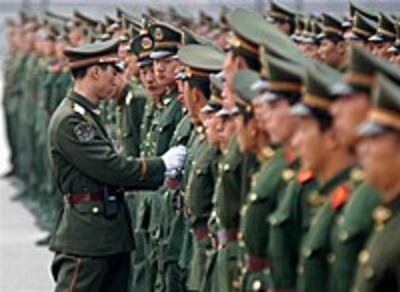
Security experts are calling for greater efforts to clarify China’s intentions following a Pentagon report on the country’s growing military power.
A May 23 report to the U.S. Congress raises questions about China’s strategic plans, saying analysts have been surprised by “the pace and scope of its strategic forces modernization.”
In addition to deploying more short-range ballistic missiles in areas opposite Taiwan, China has been modernizing and upgrading its long-range ballistic missile force, according to the 58-page Defense Department report.
The new longer-range intercontinental ballistic missiles under development “can target most of the world, including the United States,” the study says.
Another concern raised by the Pentagon report is that China appears to be developing weapons capabilities that will make it harder for the United States to come to Taiwan’s aid in the event of a clash between the self-governing island and the mainland.
China regards Taiwan as a renegade province and has refused to rule out force to reclaim it.
The Chinese are improving their ability to both threaten Taiwan in a variety of ways militarily and to complicate the efforts of the United States to come to the assistance of Taiwan in a military crisis,
China’s government and official media have reacted angrily to the report, which has been updated annually since it was required by an act of Congress six years ago.
In interviews with Radio Free Asia, U.S. military analysts voiced doubts about the risk that China’s military modernization represents. But they agreed that uncertainties make the case for greater transparency on both sides.
Wade Boese, research director at the Washington-based Arms Control Association, said that “all militaries look to upgrade and modernize their forces.”
Boese said that China has been modernizing partly to counter U.S. capabilities and technology so that it can maintain credibility for its own position on Taiwan.
“What one should derive from this report is that both countries need to act in a way that helps avoid these worst-case outcomes,” Boese said. “And the best way for them to do that is for both countries to be as open as possible with each other with regard to their intentions and what their plans are.”
China must be “more transparent about its military objectives, about its military intentions,” Boese added.
Michael Swaine, a China security expert at the Carnegie Endowment for International Peace in Washington, said there is little doubt that China is modernizing with an eye to making a potential defense of Taiwan more difficult.
“The Chinese are improving their ability to both threaten Taiwan in a variety of ways militarily and to complicate the efforts of the United States to come to the assistance of Taiwan in a military crisis.”
The Pentagon report points to China’s development of a “layered system” using 50 diesel and five nuclear submarines, maritime strike aircraft, and a fleet of warships armed with anti-ship cruise missiles.
Swaine said these are “capabilities that are designed to increase their awareness of the approach of U.S. forces, their ability to locate those forces, their ability to target those forces.”
This buildup may be aimed not at supporting a Chinese invasion of Taiwan, though, but at deterring Taiwan from declaring independence—a move that would trigger a confrontation, Swaine said.
Another question raised by the Pentagon report is whether China is planning to project its power over a wider area so that it can protect its increasingly far-flung energy investments.
The Pentagon suggests that China’s military is “generating capabilities that could apply to other regional contingencies, such as conflicts over resources or territory.”
Eric Hagt, director of the China program at the World Security Institute, a Washington-based policy research organization, said that China’s military goals are a work in progress.
While China feels compelled to modernize, Hagt said, it has not yet formulated policies to keep pace with its energy investments abroad.
“It’s not entirely clear what China’s interests are, because they are shifting quickly. And so how it’s going to protect those interests has much to do with how its military modernization and expansion...are developing.”
“I don’t think that it’s entirely clear to China at this point,” Hagt said.
Original reporting by Michael Lelyveld. Edited for the Web by Richard Finney.
